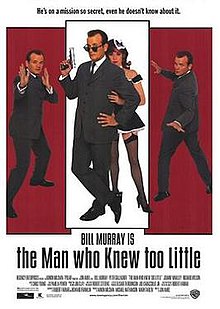
Darwinism is a theory of biological evolution developed by the English naturalist Charles Darwin (1809–1882) and others, stating that all species of organisms arise and develop through the natural selection of small, inherited variations that increase the individual's ability to compete, survive, and reproduce. Also called Darwinian theory, it originally included the broad concepts of transmutation of species or of evolution which gained general scientific acceptance after Darwin published On the Origin of Species in 1859, including concepts which predated Darwin's theories. English biologist Thomas Henry Huxley coined the term Darwinism in April 1860.

Guess Who's Coming to Dinner is a 1967 American romantic comedy-drama film produced and directed by Stanley Kramer, and written by William Rose. It stars Spencer Tracy, Sidney Poitier, and Katharine Hepburn, and features Hepburn's niece Katharine Houghton.

Father of the Bride is a 1950 American romantic comedy film directed by Vincente Minnelli from a screenplay by Frances Goodrich and Albert Hackett, based on the 1949 novel of the same name by Edward Streeter. The film stars Spencer Tracy, Joan Bennett, and Elizabeth Taylor, and follows a man trying to cope with preparations for his daughter's wedding. Father of the Bride was nominated for Academy Awards for Best Picture, Best Writing, Screenplay, and Best Actor in a Leading Role.

Matryoshka dolls, also known as stacking dolls, nesting dolls, Russian tea dolls, or Russian dolls, are a set of wooden dolls of decreasing size placed one inside another. The name matryoshka, mainly known as "little matron", is a diminutive form of Matryosha (Матрёша), in turn a diminutive of the Russian female first name Matryona (Матрёна).
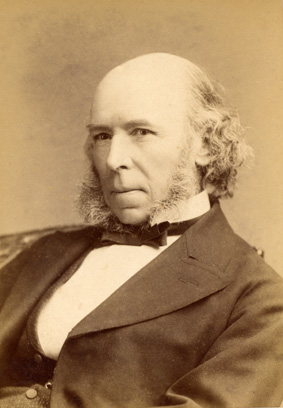
"Survival of the fittest" is a phrase that originated from Darwinian evolutionary theory as a way of describing the mechanism of natural selection. The biological concept of fitness is defined as reproductive success. In Darwinian terms, the phrase is best understood as "[s]urvival of the form that in successive generations will leave most copies of itself."

Snatch is a 2000 crime comedy film written and directed by Guy Ritchie, featuring an ensemble cast. Set in the London criminal underworld, the film contains two intertwined plots: one dealing with the search for a stolen diamond, the other with a small-time boxing promoter who finds himself under the thumb of a ruthless gangster who is ready and willing to have his subordinates carry out severe and sadistic acts of violence.
Geraldine James OBE is an English actress.

Frankenhooker is a 1990 American black comedy horror film directed by Frank Henenlotter. Very loosely inspired by Mary Shelley's 1818 novel Frankenstein; or, The Modern Prometheus, the film stars James Lorinz as medical school drop-out Jeffrey Franken and former Penthouse Pet Patty Mullen as the title character.

The Man Who Knew Too Much is a 1956 American mystery thriller film directed and produced by Alfred Hitchcock, starring James Stewart and Doris Day. It is Hitchcock's second film using this title, following his own 1934 film of the same name but featuring a significantly altered plot and script.
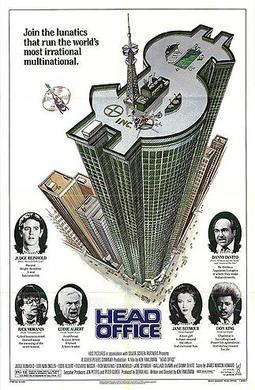
Head Office is a 1985 American satirical black comedy film, produced by HBO Pictures in association with Silver Screen Partners. It stars Judge Reinhold, Eddie Albert, Lori-Nan Engler, Jane Seymour, Richard Masur, Michael O'Donoghue, Ron Frazier, and Merritt Butrick and was directed and written by Ken Finkleman. It is also the first film to be composed by James Newton Howard.

Mark Rappaport is an American independent/underground film director and film critic, who has been working since the 1960s.

The Girl Who Knew Too Much is a 1963 Italian giallo film. Directed by Italian filmmaker Mario Bava, the film stars John Saxon as Dr. Marcello Bassi and Letícia Román as Nora Davis. The plot revolves around a young woman named Nora, who travels to Rome and witnesses a murder. The police and Dr. Bassi don't believe her, since a corpse can't be found. Several more murders follow, tied to a decade-long string of killings of victims chosen in alphabetical order.

Smart Money is a 1931 American pre-Code drama film produced and distributed by Warner Bros., directed by Alfred E. Green, and starring Edward G. Robinson and James Cagney. It is the only occasion Robinson and Cagney appeared in a film together, despite being the two leading actors, mainly portraying gangsters, at Warner Bros. studios throughout the 1930s. Smart Money was shot after Robinson's signature film Little Caesar had been released and during the filming of Cagney's breakthrough performance in The Public Enemy, which is how Cagney came to play a supporting role.
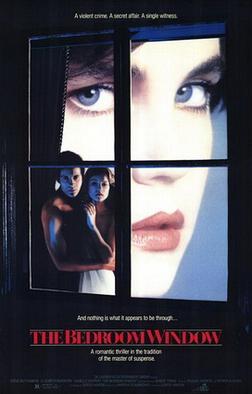
The Bedroom Window is a 1987 American neo-noir psychological thriller film directed by Curtis Hanson. It stars Steve Guttenberg, Elizabeth McGovern and Isabelle Huppert, and was shot in Baltimore in the Mt. Vernon neighborhood. Based on a novel The Witnesses, by Anne Holden, it tells the story of a young executive who starts an affair with the wife of his boss which then escalates into nightmare after he lies to the police in order to protect her.
"The English Patient" is the 151st episode of the NBC sitcom Seinfeld. It was the 17th episode for the eighth season and aired on March 13, 1997. The English Patient, central to Elaine's storyline in this episode, won Best Picture at the 69th Academy Awards, eleven days after this episode aired.

The Rich Man's Wife is a 1996 American thriller film written and directed by Amy Holden Jones and starring Halle Berry. The title character becomes a suspect when her husband is murdered and the investigating detectives are suspicious of her alibi. The film was released on September 13, 1996.
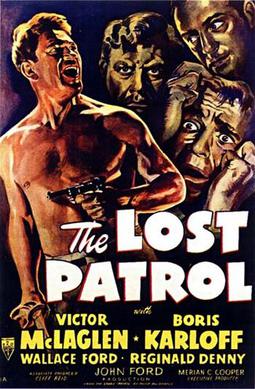
The Lost Patrol is a 1934 American pre-Code war film by RKO, directed and produced by John Ford, with Merian C. Cooper as executive producer and Cliff Reid as associate producer from a screenplay by Dudley Nichols from the 1927 novel Patrol by Philip MacDonald. Max Steiner provided the Oscar-nominated score. The film, a remake of a 1929 British silent film, starred Victor McLaglen, Boris Karloff, Wallace Ford, Reginald Denny, J. M. Kerrigan and Alan Hale.
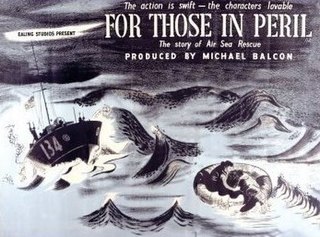
For Those in Peril is a 1944 British war film produced by Ealing Studios that marked the directorial debut of Charles Crichton. The film was developed from a short story by Richard Hillary, an RAF pilot killed in action in January 1943. The basic and relatively slight storyline of For Those in Peril was an end to produce a film with a documentary feel and an element of wartime propaganda. The film stars Ralph Michael and David Farrar.
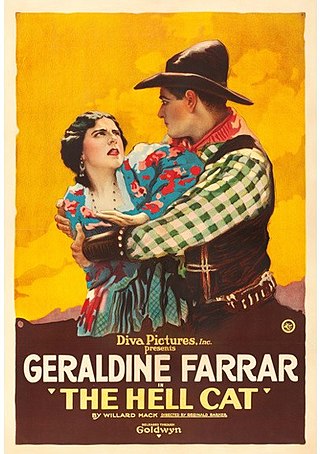
The Hell Cat is a 1918 American silent Western film produced and distributed by Goldwyn Pictures. Reginald Barker directed and Geraldine Farrar starred. It is not known whether the film currently survives.
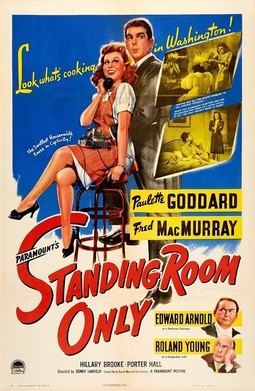
Standing Room Only is a 1944 American comedy film directed by Sidney Lanfield and starring Fred MacMurray and Paulette Goddard.
